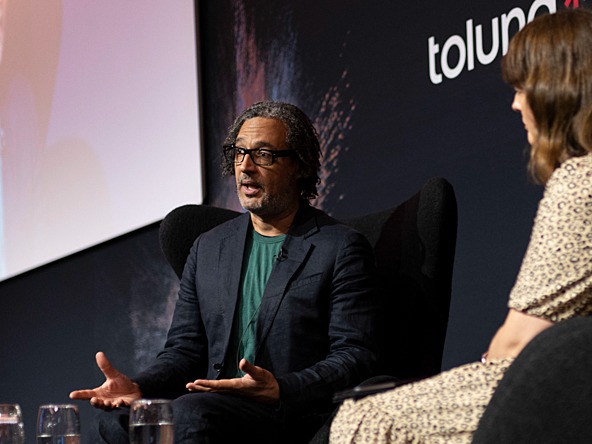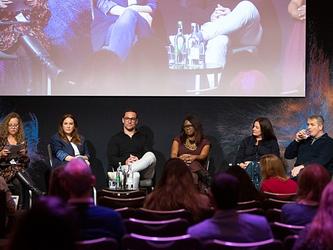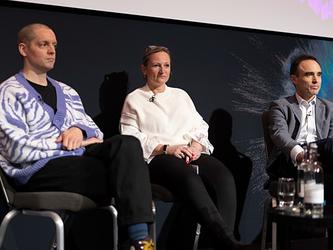David Olusoga: ‘Some things are not identities – they are metrics that we need to analyse toxic ideas’

Speaking during a keynote interview at the Insight Alchemy conference in London, Olusoga discussed the approaches used to capture data about people.
In response to a question from interviewer Sinead Jefferies about whether the use of categorisation and labelling in research survey questions can perpetuate negative stereotypes, Olusoga said: “In some ways, I want to make the case for the power of ticking boxes. I understand people’s sensitivities about those categorisations, but I worry we complain about them too much.
“If you pretend race doesn’t exist, then you are also pretending that racism doesn’t exist and the outcomes of racism don’t exist – and that is washing your hands of reality.”
Pointing to France, where data about race is not captured because race is not officially recognised in the constitution, Olusoga said: “We have all sorts of crude ways of chopping up society in a way that is easier to analyse. I’d much rather have to tick an unwieldy form than live in France.” Referencing the stop and search figures as an example, he added: “For black people in France, there are no metrics.
Olusoga continued: “Some things are not identities – they are metrics. We are going to need a metric for people who are visible minorities. I’m a Nigerian Geordie, and that’s pretty specific. We need to distinguish between identity and the need to have metrics to try to analyse how toxic ideas are affecting society.”
Olusoga also discussed how ideas from 300 years ago are pervasive and still affect society today.
“There are two forms of black history, and they’re both legitimate. One of them is centred around contribution, it’s about showing that black people have played a role, they have a presence, that is an entirely valid history. But there’s another form of the black history which is the development and evolution of the race idea. And that form of history is one we are much much less comfortable with.
“Those ideas are not just important to historians, those ideas live on. Researchers have demonstrated how these ideas still live on today.”
One example Olusoga cited was the idea perpetuated by the slave lobby that black people feel pain less than white people, with historical documents showing the same false claim made in various places around the same time.
“It would be wonderful if those documents had no relevance to the modern day. But today, in this city, black people get less pain relief from doctors. Ideas, concepts, beliefs and stereotypes have made their way into society in such a way that they affect us subconsciously.”
In another example, Olusoga highlighted the extent to which ideas become normalised within society to the point where they are ‘almost not noticed’. For example, the workforce is London is 36% non-white, but it is rare that people from ethnic minorities make up a third of boardrooms, yet this is not seen as abnormal.
“We need to recognise and be honest with ourselves about the fact that we internalise these ideas. We have imbibed the attitudes and cultures of society,” said Olusoga.
“You would have to be a fanatical libertarian to think that we control every thought that crosses our mind. We are enormously influenced in our subconscious by society. I would like to believe that my conscious feminism means that I have always behaved in a way that would reflect those conscious beliefs, but I suspect that’s not the case. I’d love to think the opposite. And it’s embarrassing to admit that, but embarrassment is not the issue, the issue is that you cannot actually avoid impacting other people.
“Recognising that we can incubate these ideas and create, without meaning to, cultures and structures that affect people, is a very hard thing to do. It’s not easy and has biased and damaging outcomes, like really good people, like doctors, under-prescribing pain relief.”
It is essential for everyone to notice, acknowledge and challenge biases, he added.
“Unless we admit, and are vocal, when we catch ourselves, and not go to being defensive, then we have real problems.
“As human beings it is literally no fun but that is the big ask if we really want a more equitable society.”
A profile interview with David Olusoga will be published in the July issue of Impact.

We hope you enjoyed this article.
Research Live is published by MRS.
The Market Research Society (MRS) exists to promote and protect the research sector, showcasing how research delivers impact for businesses and government.
Members of MRS enjoy many benefits including tailoured policy guidance, discounts on training and conferences, and access to member-only content.
For example, there's an archive of winning case studies from over a decade of MRS Awards.
Find out more about the benefits of joining MRS here.














1 Comment
Jigna
3 years ago
This was a great session to attend, thank you for the opportunity. David is a legend in my eyes and I have always been a fan of his!
Like Reply Report